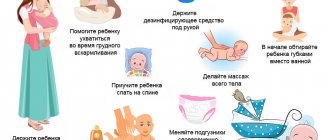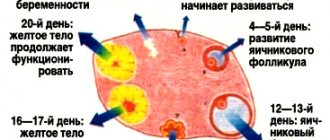Menstrual herpes is typical for women and girls from 16 to 45 years old, but is considered a rare form of this disease. The location of the rash depends on what type the patient is a carrier of. Thus, only type 2 herpes affects the mucous membranes of the genitals; in other cases, the skin is affected.
The location of the rash depends on what type the patient is a carrier of. Only type 2 herpes affects the mucous membranes of the genitals; in other cases, the skin is affected.
Viral disease and the female cycle
During the active phase, the infection is accompanied by the formation of vesicles containing liquid inside. When located in the lip area, they burst over time, and crusts form in this place. When rashes form on the mucous membrane of the female genital organs, there are no crusts. Until the rash appears, swelling, itching and soreness are observed at the site of the lesion.
If left untreated, blisters can form:
- in the oral cavity;
- on the buttocks;
- on mucous membranes and in the nose.
Among the provoking factors of the rash are:
- avitaminosis;
- insufficient oxygen supply;
- overheating or hypothermia of the body;
- sexual contact with a carrier of infection.
The course of the pathological process is complicated by the fact that the possibility of developing an internal herpetic disease cannot be ruled out, as a result of which organs are affected and the woman’s health deteriorates.
Before and during menstruation
In the period before critical days, herpes is accompanied by a decrease in the immune system , which occurs as a result of hormonal imbalance. In preparation for the cycle, all the body’s forces are aimed at restoring organs after a condition characterized by the release of an unfertilized egg. In addition, there is active regulation of hormonal processes, in which there is a decrease in some hormones and an increase in others.
Some representatives of the fair sex may already develop pathologies in which the reproductive function is disrupted. Against this background, the virus is activated, as a result of which the genitals and lips are affected .
The danger of herpes during the period before the onset of menstruation is that the infection can spread to the uterus and vagina .
The most favorable period for the development of pathology is the period accompanied by the course of menstruation. During the cycle, the processes of herpes reproduction intensify.
This condition is accompanied by the following manifestations:
- burning and itching sensation ;
- discharge from affected areas upon contact with clothing;
- increased pain in the perineum and lower abdomen.
Doctors' opinion
Doctors strongly advise not to neglect the manifestations of herpes and, even if the vesicles are localized on the face and not on the genitals, to seek medical help. The fact is that recurrent rashes on the face may indicate the development of the disease. This means that no one can provide you with guarantees that the next time before your period you will not find rashes in the intimate area. An neglected virus can lead to the appearance of such concomitant diseases as cystitis (inflammation of the bladder), urethritis (inflammation of the urethra), as well as complications in the form of extensive blood loss during menstruation and serious disruptions in the cycle.
But, despite the fact that experts insist on the need for treatment, they warn against attempts to cure a complex disease using traditional methods. Firstly, there is absolutely no guarantee that “grandmother’s recipes” will improve your well-being.
Secondly, there are also no guarantees that natural drugs (which are known to be the strongest allergens) will not complicate the course of the disease. Therefore, the overwhelming majority of doctors advocate traditional medicine, the effectiveness of which has been proven by results and time.
Localization location
As mentioned above, menstrual herpes can appear on various parts of the body.
On the lips
Before the onset of menstruation, the following symptoms are observed:
- increased irritability;
- stomach ache;
- drowsiness;
- decreased motor activity.
Due to hormonal imbalance, a woman’s sensitivity to various irritants increases. As a result of this, the body is exposed to stress, against which the protective functions are weakened, and herpes type HSV 1 begins to become more active. This contributes to the formation of herpetic blisters in the area of the corners of the lips. This is how the female body reacts to irritants. If you do not follow the rules of hygiene procedures, then the virus is transmitted through your hands to the genitals and other parts of the body.
Genital
A rash in the genital area can be caused by the HSV 2 strain , which is transmitted through sexual contact . The manifestation of infectious pathology goes through several stages:
- itching and swelling of the perineum;
- redness and blistering;
- vesicle breakthrough and formation of ulcers with no crusts.
Additionally, the pathological process is accompanied by an increase in body temperature , pain in the perineum and a general deterioration in well-being .
Getting rid of an insidious disease
Menstrual rashes can be diagnosed only after examination by a doctor and research results. Therapeutic therapy is prescribed according to the individual characteristics of the body and the symptoms of the disease.
It is completely impossible to get rid of the herpes virus, but it is possible to stop the development of the sore.
To eliminate the visible symptoms of herpes on the lips, ointments and sprays are used. If necessary, the doctor prescribes injections or tablets. The most effective drugs in such cases are the following: Acyclovir, Genferon, as well as Epigen, Valtrex, Alpizarin, etc.
To increase the body's protective functions, it is recommended to take vitamins and medicinal herbal decoctions. You can strengthen the immune system by taking interferons, as well as tinctures of Echinacea, Eleutherococcus, Rhodiola rosea, etc.
You can wipe the affected skin with a decoction of oak bark, which has an astringent effect and dries out blisters well.
Is it possible to have a delayed period due to a herpes infection?
It is possible that with the development of menstrual herpes there may be a delay in the onset of menstrual periods. However, this condition is possible only in the presence of certain factors, that is, when the virus is activated even before the appearance of discharge. Since the female body reacts to various irritants, all forces are spent on protecting against the pathological process, against the background of which a shift in the menstrual cycle is observed. A delay in menstruation is also possible when taking medications such as antibiotics or antivirals. Menstruation is restored after the infection becomes passive.
Reasons for appearance
The main cause of menstrual herpes is a decrease in immunity caused by natural changes in hormonal levels that occur at the end of the cycle.
Recurrence of genital herpes provokes hypothermia.
Recurrences of infection are also caused by poor intimate hygiene, the use of synthetic underwear, hypothermia, poor diet and genital diseases.
Therapy
When the first symptoms of a herpetic lesion appear, you should immediately seek medical help. A gynecologist treats menstrual herpes.
It is important to remember that there is no need to wait for the end of menstruation, since at that moment the symptoms subside, and during the next cycle they may manifest more pronounced symptoms.
The sooner therapeutic measures begin, the greater the chances of achieving long-term remission.
Prescription of medications and dosage is carried out exclusively by a specialist. Treatment should be carried out not only with local drugs, but also with systemic drugs.
Antiviral drugs include :
- Valaciclovir.
- Acyclovir.
- Famciclovir.
These may be tablets, creams or ointments .
In addition, some suppositories that have antiviral and immunomodulatory effects. These include:
- Viferon.
- Genferon.
The following immunomodulators in the form of injections :
- Allokin-Alpha.
- Cycloferon.
Among antiviral ointments, the most popular are:
- Megasyn.
- Bonafton.
is recommended to take a vitamin complex containing vitamins A, E and C. After the symptoms of the disease have subsided somewhat, take B vitamins .
To relieve pain, anti-inflammatory drugs are prescribed ( Nimesulide, Ibuprofen and others). For heavy menstrual flow, Etamzilat or Vikasol .
Treatment of menstrual herpes
A woman needs to see a specialist on the day her menstrual cycle begins. Treatment takes 4 to 6 weeks and involves the use of antiviral drugs.
Drug treatment
It is impossible to put herpes virus cells into a dormant state with local drugs, so the doctor selects systemic agents. The patient is prescribed a course of injections with immunomodulators; Cycloferon is most often used for these purposes. An adult should take 3-4 tablets half an hour before meals once a day. For the first 2 days it is recommended to take the medicine daily, then the break is increased to 2-3 days. The course lasts 6 weeks.
To prevent herpes from spreading through the mucous membrane of the labia during menstruation, use local antiviral drugs in the form of ointment or cream - Acyclovir, Panavir, etc. Any of the products are applied to the affected area up to 5 times a day.
To strengthen blood vessels, take vitamins A, C, E, and then switch to group B substances.
For medications to be effective, you should balance your diet by reducing the amount of fast carbohydrates and fats you consume.
It is impossible to put herpes virus cells into a dormant state with local drugs, so the doctor selects systemic agents. The patient is prescribed a course of injections with immunomodulators; Cycloferon is most often used for these purposes.
Read also: Herpes in the blood Signs of herpes on the chin Read more
about the treatment of herpes on the body in adults with drugs - read here.
To relieve pain, it is recommended to take non-steroidal anti-inflammatory drugs, for example, Ibuprofen. It is taken as needed, but not more than 5 tablets per day.
Prevention
To avoid the development of the disease, you must follow certain recommendations:
- avoid contact with carriers of the virus;
- refuse to frequently change sexual partners;
- use protective equipment;
- timely carry out therapeutic measures to eliminate chronic diseases;
- avoid overheating and hypothermia.
In addition, it is important to adhere to the right lifestyle, which will help maintain the body's defenses at the proper level.
Preventive actions
Statistics show that herpes spreads mainly through direct contact with an infected person, in particular during sexual intercourse. This is why it is very important to use condoms, be careful and avoid casual sex. But the virus also spreads through household means, so sometimes it is impossible to prevent infection of the body.
Because of this, it is very important to maintain normal immune system activity. Proper nutrition, walks in the fresh air, periodic intake of vitamins, physical activity, stabbing - all this helps to improve the functioning of the body. Smoking and alcohol abuse are contraindicated. It is also important to choose the right intimate hygiene products, avoid wearing synthetic underwear that is too tight, and also avoid hypothermia.
Article source: https://labuda.blog/1060174.html
Useful video
Watch this video about how to treat herpes on the lips:
Similar articles
- Acyclovir for genital herpes
The use of Acyclovir for genital herpes is still relevant, although it is a first-generation drug. During pregnancy, there is a special regimen; in other cases, it is possible to prescribe tablets, ointments, and droppers. Read more - Genital herpes in women: symptoms, analysis...
Since 90% of people have herpes itself, it is transmitted sexually or through mucus, an exacerbation can occur at any time. Once genital herpes is diagnosed in women, there cannot be a complete cure. Nevertheless, it is worth doing everything to prevent it from becoming recurrent. Read more
- Analysis for TORCH infections: which ones are tested, how much is done...
An analysis is carried out for TORCH infection both at the planning stage and already in the first trimester. Why is this necessary? To exclude fetal pathologies and infection during pregnancy. Which ones are taken, how to prepare? How long does the analysis take, and what is the interpretation of the results? Read more
- Hidden sexually transmitted infections: symptoms, PRC and others...
Hidden sexually transmitted infections can exist for a long time and unnoticed, resulting in complications sooner or later. Symptoms are often subtle. It will help to identify PRCs, their type and activity, in order to begin treatment. Read more
Possible complications during perimenopause
Menopause occurs in every woman of mature age. Immediately before menopause there is a period of so-called perimenopause. During this period, a woman still has periods, but her body begins to change and they become irregular, and hormonal balance is also disrupted.
It is during perimenopause that your periods are felt more strongly than ever. A decrease in the amount of sex hormones not only affects the nature of menstruation, but also affects other organs.
There is a decrease in elastin in cartilage joints, and calcium is also washed out of the bones. It is not surprising that in such a situation your legs ache before your period. Moreover, not only pain is felt in the legs, but numbness and cramps may also occur.
Problems in women of childbearing age
It would seem that with the normalization of hormonal levels, stabilization of the menstrual cycle and the beginning of regular sexual activity, the legs should stop hurting. However, it is not uncommon for women to encounter this problem for the first time during their fertile age.
There are 4 main reasons that explain why legs hurt before menstruation in mature women.
Premenstrual syndrome occurs due to changes in hormonal balance. There are a huge number of signs of PMS and they all manifest themselves differently depending on the individual woman. There are often cases of fluid retention in the body, which causes the legs to swell and then begin to hurt. Usually the pain is not severe and feels as if something is bursting from the inside. Gynecological diseases are very rare for girls, but for older women they become a harsh reality. Many diseases can be hidden for years, and their symptoms are so insignificant that they are not paid attention to. Algomenorrhea, fibroids, endometriosis and other diseases can affect the entire body. If the pain in the lower extremities before menstruation is regular, severe and does not go away, then you should consult a gynecologist for a full examination. It’s trite that the problem may be hidden in a diseased spine. The pain just radiates down the skeleton
Usually in such a situation it seems that the legs are twisting, and before menstruation this problem arises because the sensitivity of the body increases during this period. Do not forget about previous operations (no matter on what part of the body). The operation can act as an irritant that will affect the nerve endings of the legs and pelvis
Due to the active work of the uterus before menstruation and increased blood flow, pain may be felt more clearly.
It is quite normal for your legs to hurt after childbirth. The pelvic bones return to their normal position, so over time the discomfort will pass.
Course of relapses
The course of the disease can vary in severity:
- Mild degree is characterized by rashes no more than 3 times a year.
- Moderate severity occurs 4 to 6 times a year.
- Severe severity occurs almost monthly.
The course of the disease may vary:
- Monotonous course of the disease. In this case, relapses appear very often and are equal in time to the period of remission. Menstrual herpes just belongs to this type. Every month it worsens and is difficult to treat.
- The arrhythmic course of the disease, in which days of improvement and days of exacerbation of herpes periodically alternate. The period of weakening of the disease lasts from several weeks to several months. The longer the period of remission lasts, the longer and more severe the period of exacerbation of herpetic infection passes.
- The subsiding type is the most favorable course of the disease. The time of remission increases, and the severity and duration of exacerbation decreases.
Complications
Frequent relapses negatively affect the skin of the genital organs and the condition of the body as a whole. Ulcers on the genital mucosa disrupt metabolic processes in cells. The skin cracks and becomes dry. The infection easily penetrates through them. Long-healing cracks appear on the mucous membrane of the vagina and anus; they hurt, itch, and cause discomfort during bowel movements. The rectum becomes inflamed, mucus and blood particles appear. In the future, this threatens with inflammatory processes and the appearance of hemorrhoids.
Cracks in the vagina, anus against the background of decreased
immunity provide an excellent opportunity for pathogens to penetrate and develop. Thrush and intestinal dysbiosis often make themselves felt. Recurrences of herpes are dangerous due to the addition of other viruses. Papillomas may appear. And this is a precancerous condition of the genital organs.
The presence of the herpes virus in the blood is dangerous for spreading to other organs and systems. Damage to the peripheral nervous system is especially dangerous. The source of the lesion is the pelvic nerve plexus. The woman feels unbearable pain in the lower abdomen. There are no rashes on the body. Herpes is difficult to identify; its manifestations are often confused with symptoms of osteochondrosis. With complications of genital herpes, pain is felt in the lower abdomen and radiates to the rectum and perineum. Damage to the sciatic nerve causes pain in the leg.
Complications of menstrual herpes can completely destroy sexual life and family life. Herpes often causes miscarriages and causes fetal pathologies. A woman feels discomfort, pain during sexual intercourse, and turns into an irritated, nervous person.
What to do with pain
It is difficult to deal with pain without knowing the causes of its occurrence. If the matter is the body’s natural reaction to menstruation, then doing anything is extremely difficult. If the problem is caused by pathology, then it must be found by a qualified doctor.
Painkillers should be used in extreme cases, and they should be prescribed by a doctor. Although cases of severe pain in the legs are extremely rare. At least you can always endure it.
- Give your feet a massage. You can perform this procedure yourself.
- Wear comfortable shoes. It is better not to wear high-heeled shoes until the pain goes away.
- Strengthen your leg muscles. There are a number of simple exercises for this.
- Take contrasting foot baths. If you have heart problems, then it is better to ignore this recommendation.
Regardless of age, you can implement the above tips. If the problem repeats every cycle, the pain intensifies or causes excessive discomfort, it is best to consult a doctor.
A woman who experiences an unpleasant burning sensation in the perineum during her period and after it cannot feel comfortable. This condition is an alarming sign. After all, itching during menstruation can have both superficial causes, which cannot be eliminated without much difficulty, or more serious ones, requiring medical intervention and drastic measures.
Irritation is caused, on the one hand, by insufficiently frequent washing away of the manifestations of menstruation. In such an environment, various kinds of microorganisms (bacteria, fungi) multiply quickly, causing itching. On the other hand, itching during menstruation can be associated with excessive washing and the use of various hygiene products that can negatively affect the skin, drying it out and causing a burning sensation.
The reason may be related to the use of conventional hygiene products. Unpleasant sensations may result from infrequent replacement of absorbent tampons (pads), as well as the use of those that cause an allergic reaction.
Constantly wearing underwear made of material that is non-breathable and unfriendly to the body (synthetics, satin) can become an irritant under normal conditions. On menstrual days, when the skin is most vulnerable, the risk of discomfort increases.











